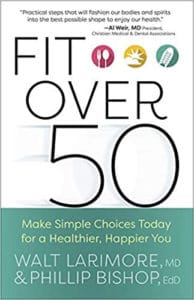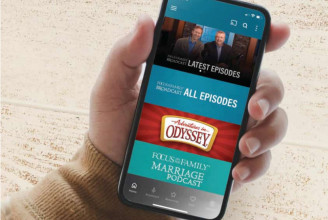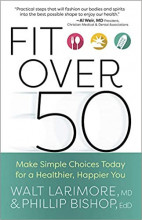Teaser:
Man #1: As I get older, I know I need to watch my weight more carefully, (chuckling) I can’t suck it in like I used to.
Woman #1: I’m trying to keep physically fit, but my knees and my back are slowing me down.
Man #2: Well, my dad had his first heart attack at age 60 and I don’t want to be like him.
Woman #2: My doctor says no more sugar, salt, fat, or caffeine. I may as well give up eating.
End of Teaser
John Fuller: Well, maybe you can relate to those comments. It’s been said that with age comes wisdom, but age also brings up some health concerns, especially as you hit the middle years. And, uh, that’s our topic today on Focus on the Family. Your host is Focus president and author Jim Daly. And I’m John Fuller.
Jim Daly: I’m thinking, John, the middle years. I don’t think I like them very much. (Laughter)
John: It’s an expanding number of years.
Jim: I’ve arrived in the middle years.
(LAUGHTER)
Jim: Well listen, turning 50 is definitely a major milestone. I am gliding through this decade of the 50s. I’m in it. And I think it’s safe to say we’re no longer young.
John: No.
Jim: One of the things I feel, I mean, just doing regular stuff like yard work. I’m far stiffer…
(LAUGHTER)
Jim: …In the joints and the muscles than I used to be. It’s like, what have I done? Oh, just yard work. It’s sad.
John: Yeah, I used to be able to kind of weekend warrior it around the house and do yard projects and stuff with no ill effects at all and now I have to schedule a physical therapy appointment if I’m planning on doing anything like that.
Jim: (Laughter) That’s – that’s my point. Well, listen, we’re going to complain a lot about our ills today, but, uh, we think this is very valuable. We have a wonderful guest – actually, two wonderful guests to talk about this topic of fitness.
Jim: I think it does apply to anybody probably over the age of 25 or 30. And, uh, you – if you’re below 50, don’t tune out because these are the things that you need to be aware of. And there’s always exceptions, of course. But stepping over that line and I think 50s is a good line to think about because it’s significant for a lot of reasons. But you’re no longer building your life. You’re kind of in it. You’re confident about who you’ve become, hopefully in Christ with humility, your households in order. Things are going pretty well in that 50s decade. But, uh, the one thing that can slip is your health.
John: Yeah. And we’re so fortunate to have the expertise of a former colleague and friend here. Dr. Walt Larimore joins us. He’s been practicing medicine for nearly 40 years and currently works as an occupational physician at Concentra and UCHealth here in Colorado Springs. And Walt was the vice president at Focus and physician in residence for us from 2001 to 2004. Um, he’s an educator, a medical journalist and author of more than 30 books, including Fit Over 50: Make Simple Choices Today for a Healthier, Happier You. Stop by focusonthefamily.com/broadcast to get your copy.
Jim: And I get the privilege of also introducing my wonderful wife, Jean, who I asked to join us because we needed a female perspective at the table. So, Jean, welcome back.
Mrs. Jean Daly: Well, thank you. It’s always a pleasure being here and I’m excited about the fabulous content of this book and this interview today. And it isn’t just for those over 50.
Jim: Yeah. That is true. And it is good to have both of you here. Okay, Walt, let’s start with a general definition of good health. You know, we always check that box, right? Excellent health, good health, fair, poor. Who checks the poor box? I mean, really.
(LAUGHTER)
Jim: I mean, really. That’s got to be a lot of Christian honesty to say, “Yes. It’s poor.” I mean, we’re all going “Basically good enough.”
(LAUGHTER)
Jim: What is good health?
Dr. Walt Larimore: Hope – hope it’s good enough.
Jim: I’m planning on it being good.
Walt: You guys look like you hadn’t even had a birthday in 10 years.
(LAUGHTER)
Jim: Yeah right. Mr. compliment …
Walt: Good to be back with you.
Jim: Go for it.
Walt: Well, my conundrum was I was asked that question. I just finished residency at Duke. I did residency in family medicine, sports medicine. And then Barb and I went out to the mountains of North Carolina to a little town called Bryson City. Town of 900 people.
Jim: You’ve written about that and some of your books.
Walt: Yeah. 900 people. 38 Baptist churches.
Jean: Wow.
Jim: (Laughter) God bless the Baptists.
Jean: Yes.
(LAUGHTER)
Walt: Yeah. I mean, one of everything else. But a second grade teacher called me and asked me if I would come, as a new doctor to town, would I come speak to our class? And I said, “Sure. I’d love to. What about?” She said, “About what is health?”
(LAUGHTER)
Walt: I thought, well, I can take care of sick people and diseased people, but what is health? It really – I thought, my goodness, what is it? And it actually led to a research project. I was doing some research training at the time. And so, I surveyed 200 healthcare professionals, health policy people, in 60 countries around the world.
Jim: Huh.
Walt: And I asked them, what his health? What are the top three factors that you would recommend to your family and friends? And it was from that research that this book and others have begun. But I thought what was fascinating was these secular researchers, the secular policy people, defined health four ways. They said yeah, there’s physical health. And we can have an impact on that. But there’s also relational health. There’s family health or social health. And boy, in these days, we’ve seen some social unrest. That’s not healthy. And then there’s emotional and there’s mental health. And, of course, with a quarantine that we’ve all gone through, we’ve seen the impact of that. And then perhaps the most important of what I now call the four wheels of health – physical, emotional, relational – the most important spiritual and even the secular researchers realize that. Of the four wheels, that’s the one connected to the power steering.
Jim: And that’s really interesting and we’re going to cover those four. Um, but, you know, ironically, Jean, you kind of attach quickly to the relational tire in Walt’s analogy, which is funny to me, because good health to me is okay, I’m an exercise enough and I’m going to eat pretty good. That’s good health. But it is much more than that. And Jean, I think as a woman and one of the reasons I wanted you here is you quickly gravitated toward the relational tire. And I’m thinking what? That’s like in the way of good health.
Jean: (Laughter).
Jim: If I got to talk to somebody and I can’t go exercise. Doesn’t that get in the way of good health, John?
John: Yeah, I think so. That qualifies.
Jim: Okay. Right. That’s how most guys think. How do girls think?
Jean: Well, and I want to say, before I saw Walt’s book, I thought of just – what if someone were to ask me what is good health? I would have thought diet and exercise. But you’ve helped me realize what is true in my life, that it is much more than that. And yet the relational aspect is significant and not just for women.
Jim: (Laughter).
Jean: But I think for all people. But…
Jim: I think it was meant for me.
Jean: …The spiritual. So that’s why I’m eager to hear, Walt, your insight on all of this.
Jim: Well, let’s touch on that one for Jean’s sake. (Chuckling) Let’s go to the relational wheel and then we’ll move to the physical. And then next time we’re gonna have you back, we’ll talk about the other two. But what’s the relational side of it?
Walt: Well, all four of those wheels – physical, emotional, relational, spiritual – are interconnected. You cannot be healthy in one, and unhealthy in the others. It just doesn’t work. If – sort of think of your car. If one of the tires starts to go flat or starts to be out of alignment, you’re not gonna be able to go as fast as you want or as far as you want and if you try to drive with that thing wobbly, your repair bills getting more expensive by the mile. (laughter)
Jim: Now let me just say, I can confirm that because yesterday we went on a bike ride.
(LAUGHTER)
Jim: Isn’t that good? I just wanted to mention that.
Jean: Coincidentally. Yes.
Jim: However, my back wheel was low on air and it was very – much more difficult.
(LAUGHTER)
Jim: I’m not going to say Jean beat me to the house, but she actually did beat me to the house.
Jean: Well, that’s because you kind of cheated at the end.
Jim: But I was riding on a flat tire.
Walt: So, with relationships, it’s funny. As a physician, most of the men I see are there not because they’re not healthy, it’s because a woman in their life said, “You go or else!”
(LAUGHTER)
Walt: You know, I mean, it’s the women in their lives, the daughters, the sisters, the wives or girlfriends who are saying, “Your wheels are a little wobbly. Get it checked.”
Jim: Let me ask you, though, Walt, really on the relational wheel, in all seriousness. Again, gender, I think, does play into this. I don’t know that men, you know – when we use survey men – who’s your best friend? How many of you have a best friend? A lot of people, a lot of men say, “I don’t.” And so, women gravitate toward that relational health pretty easily. Not – not always. But let’s speak to the two genders in that regard. Women who are struggling with healthy, good relationship and the men who just don’t. Other than superficial – and I can be that way. Let’s go play golf. That’s fun. We don’t really talk that deep. Good shot. Nice putt.
Walt: (Laughter).
Jim: Um, how do we get into a deeper relationship as men?
Walt: Yeah and it’s critical to understand that it’s critical. When we look at the example of Jesus, he majored in relationships. He had the three to whom He was the closest and the most intimate, rested on each other’s chests. I mean, really close. And then He had the disciples, a group that He spent a lot of time with, teaching, getting to enjoy and getting to lead. And then He had the followers and then… But He emphasized relationships. And we are commanded in Scripture to act in every way as He acted both with those of the faith as well as – I love – my favorite name of Jesus, friend of sinners. Spent time with the tax gatherers and the heathen, people that didn’t know Him. That majoring in relationships. Well, when we look at the medical research, what we find is that people who build positive, affirming relationships – that doesn’t have to be a lot – do better emotionally. They do better physically and spiritually we cannot be as healthy as we’re designed to be without that fellowship, that accountability. You know, Scripture has 40 one-anothers that we’re to do with one another.
Jim: Hmm.
Walt: So, it’s a critical part of our health.
Jim: No, it’s good. Now, I just want to ask Jean. Did we cover the relationship wheel significantly? Or adequately?
Jean: Well, yes.
Jim: Okay. Good.
Jean: Thank you for asking.
Jim: You have any other… (laughter)
Jean: Well, and – and I think it’s important also to emphasize – Walt, that you mention the positive relationships and that can be challenging because we do have friends or family members in our lives that, um, don’t contribute to a positive relationship, so if there’s someone who’s really negative and I can’t help spin the conversation, can’t help, um…
Jim: Move it positive.
Jean: Yeah. Move it in a positive way. They keep getting back to negative. I’ve found myself kind of distancing from that a little more. And I – I think that’s probably healthy.
Walt: Yeah. I love the writings of John Wesley, the co-founder of Methodism, lived back in the 1700s. But he was so concerned about the health of his family, of his friends, of folks that he fellowship with that he actually wrote a little piece about. It’s called The Healthy Physick and “physick” meant health back then. But he listed 37 principles of being highly healthy and several of them were relational, but one that you’ll really resonate with, Jean. It was actually his number one health recommendation. He said people should have those who are much about them, around them, who are sound, sweet and healthy.
Jim: I like that idea. (laughter)
Jean: Hmm.
Walt: And it’s that – it’s finding those positive…
Jean: Yes.
Walt: …Relationships. Shedding the ones that are dysfunctional, that are harmful to you, and in focusing on the positive. It’s a critical part of our health. And maybe later we can talk about a test that I have that people can take, that they can actually measure their physical, emotional, relational and spiritual health. Just to see where you’re at, because we don’t know unless we look. It’s sort of like your bicycle tire.
Jim: (Laughter).
Walt: If you had just checked the air in that thing before you rode…
(LAUGHTER)
Jim: I thought about it, but Jean and Troy took off like…
Jean: (Laughter).
Jim: …You know, race car drivers.
(LAUGHTER)
Jim: And I was like, “Okay. I’m not going to let him get that far ahead of me.”
John: Well…
Jean: Well, and I just – I know this may sound contradictory, but, um, I just mentioned how important it is to have positive relationships. And, of course, especially with family members or, um, outside of our immediate circle, I’m not suggesting to cut people off, and – and to spend time in prayer. And I do that and ask God to help me with that relationship. And, but…
Jim: I’m sorry. (laughter)
Jean: Oh, oh. Yes. Sorry. I wasn’t tracking with that.
Jim: I’ll do better.
(LAUGHTER)
Jean: Well, it’s not you.
Jim: Okay. Whew! Okay. I’m happy.
(LAUGHTER)
Jean: But distancing is okay. Not talking to that person every single day.
John: Yeah.
Jim: Yeah. There you go.
John: Well, we’ve had some really good conversations about being fit over 50. I don’t think we’ve touched on anything yet…
Jim: We’re about to.
John: …Specific to 50s. It’s great stuff with Dr. Walt Larimore. He has written this book Fit Over 50 and we’ve got it at focusonthefamily.com/broadcast. Call us if you have any questions. 800, the letter A and the word FAMILY.
Jim: Walt in your book, to John’s point, Fit over 50. Let’s get to it. You identify five habits that can help us live 10 years longer. That’s a nice doctor transaction.
Walt: (Laughter).
Jim: I may have start coming to you. But, uh, what are those five habits?
Walt: Well, there’s a tremendous amount of research on this. And it’s not just Fit Over 50. In fact, the folks that endorsed the book and a lot of them have been on this program. You think of Pat Morley and Pat Williams and Dr. Gary Chapman and Jim Daly has been on the program once in a while.
(LAUGHTER)
Jim: Here and there.
Walt: All said, what a terrible title.
(LAUGHTER)
Walt: I mean, it shouldn’t be Fit Over 50. It should be Fit Overall because the principles work…
Jean: Yes.
Walt: …For every one of us. But particularly these five. Researchers at Harvard have been for over a decade looking at what is it that makes people the most healthy. If we had to look at something that would reduce the risk of premature death, the greatest – what would it be? And they’ve identified five habits that they say every one of us should employ. Number one, never smoke. Never used tobacco products.
Jim: Or go – or go out with girls that do.
(LAUGHTER)
Walt: Don’t smoke or chew or go with girls who do. Number two, maintain a normal weight. Or as close to normal weight loss as you possibly can.
Jim: I don’t like that one.
(LAUGHTER)
Walt: I resemble that remark.
(LAUGHTER)
Walt: Number three, daily movement. 30 or more minutes of movement, some type of exercise, five days a week. Number four, no or limited alcohol. And number five, a high quality, nutrient dense diet, a good nutrition plan. And the data on this is stunning. If you look at 50-year-olds, just as an example, the average male who at 50 is doing these five things will live almost 25 years longer…
Jim: Wow. Think of that.
Walt: …Than the male who’s not doing that.
Jean: Wow.
Walt: And the average female that’s doing that will live almost 38 years longer. It’s a 50%…
Jim: 38 years.
Walt: … 58% increase in life expectancy starting at age 50 if you do that. And so, subsequent to the publishing of the book, a number of the press folk pushed the Harvard people and they said, “Well, not everybody can do this.” Or “Not everyone will do this.” I mean what’s…
Jim: Well, that’s true. Look around.
Walt: …What’s the use of living longer if your life qualities terrible, for example, they said. And so, the researchers, the Harvard folks, actually went back and looked back at it. They said, “Well, what if I’m overweight? And I just can’t get down to a normal weight? Am I doomed?” And so, they look back through their data to say, “Well, what if you only had three or what if you have only four of these? Does it still benefit you?” And without question, it does. For example, if you have four of those five and you’re a female, then you’re looking at another 10 to 11 years of life expectancy over someone who doesn’t have…
Jim: Having four out of the five.
Walt: Yeah, having four out of the five…
Jim: Three out of the five?
Walt: Three out of the five, you’re down below 10 years, but you’re still ahead of the curve. So, even a few of them makes a difference. What was even more remarkable was, well, what if you get sick? If you have three of these or four of these or five of these? Does it change illness? And the answer is not just yes, but oh, heavens, yes, it does. So, for example, with people diagnosed with cancer who had all five, they lived 20 – half of them lived 23 years longer. Of those who did not have any of the five, only half lived about 10 years longer with cancer. So…
Jim: You’re making the case for sure.
Walt: Well, they sure are. And the same thing showed up, Jim, for diabetes, for heart disease. Um, yeah. You know, our cars is going to get older. Our wheels are going to get rusty. They’re going to get wobbly. You know, John, you’re feeling it when you – you pull…
John: When I look at myself in the mirror.
Walt: You just do.
(LAUGHTER)
Walt: So that happens with aging.
Jim: You’re doing great. I mean, really. I mean really John’s doing great. He may be a little underweight, actually.
Walt: But if you want to reduce your risk, and the risk of those you love, with premature death, this are five things that you can begin. Pick one. Pick one of the five and concentrate on it. And when you conquer it and you have fruit there, go to the next one.
Jim: You implied one. And I want to highlight it because my doctor seems to highlight it for me every time, I see him. It’s the BMI. Now, I like BMW. I don’t like BMI so much.
John: (Laughter)
Jim: What is BMI?
Walt: So, it’s just your body mass index. It’s a combination of your weight and height. It’s a mathematical formula that’s very complex. But there’s plenty of charts on the Internet…
John: Yeah, you can find calculators online.
Jim: Well, what value is it? I mean, really? (laughter)
Walt: Well, if it tells you’re what they call normal weight versus overweight versus extreme overweight versus obese class one, obese class two and morbid obesity. With each of those classifications, as you move above normal, your risk of premature death goes up. And so, it can become kind of a way to look at where am I and what do I need to begin to think about and concentrate on?
Jim: Yeah. Do you think Peter may have missed that vision God gave them? I think he did in the area of kale. I don’t think God said to eat kale.
(LAUGHTER)
John: There was no kale in Eden.
Jim: I think Peter missed that. God said, “Eat everything but kale.”
Jean: Right.
(LAUGHTER)
Walt: It’s probably one of the unclean foods that Paul said you could eat.
Jim: I mean, what – what is that stuff? I mean, you taste it, it’s like, wow, why eat that?
John: The texture of it all. Yeah.
Walt: Don’t put a stumbling block. I am – a terrible allergy to broccoli. I eat and I get a bad taste in my mouth. So, I’m certain that must be – must be…
(LAUGHTER)
Jim: I’m all in on broccoli, but kale is, you know.
John: So, while we – you’ve been quoting a theologian about physical health and there are some people in the Christian community who are either “A” going to be fatalistic. “God knows my days, so whatever.” Or “B'”, What’s the use? Because my physical body doesn’t matter.” What do you say to that?
Walt: Well, I think the heresy of my physical body that doesn’t matter has been around since the First Century because God clearly incarnated, put into a body into flesh, His only begotten Son, who was tempted in every way, as we are tempted, yet did not sin, who understands suffering and travail, who could have given up the spirit after 10 minutes on the cross but chose to suffer, chose to enter into our suffering. He has given us a body that He has divinely designed, and He’s divinely designed for it to operate well. And when it doesn’t, when there are those diseases or disasters or disorders that hit us – and who comes to my minds, Joni Eareckson Tada.
Jim: Right.
Jean: Uhh.
Walt: Who is extremely healthy, not so much physically because of the body, because of her quadriplegia. But talk about a woman who’s healthy emotionally, relationally and spiritually. Highly healthy, even with a body that’s not doing well. But with the promise in Scripture that one day each of us will have that body that’s whole, complete. No more pain, no more suffering, no more tears. The physical is critical. God gives us four “T”’s, I believe, to steward. I had an old mentor teach me this. We always talk about time, treasure and talent. We don’t talk about the Temple of the Holy Spirit…
John: Hmm. Which is our body.
Walt: …That we are to steward and care for.
Jim: Mm hmm.
Walt: And the purpose of this book was to help people steward the Temple of the Holy Spirit, not just for themselves, but as an evangelistic tool. This is a book you can give to your grandparents, your aunts and uncles, your older colleagues, because it emphasizes not just the physical, but also the relational, emotional and spiritual.
Jim: Right. And we’re nearing the end today. Walt, we’re going to come back next time and talk to the mental health components, those things, and continue the physical. But let’s, let’s turn that corner toward the physical even more so. Um, you know, weightlifting is something you talk about, and I’m not gravitating – Jean’s thinking, oh, you’re cherry picking, no, I’m not. But weightlifting is something you talk about. It’s interesting for me, before COVID, I was – I was doing well with that. Right, Jean?
Jean: We were doing…
Jim: Yeah, actually.
Jean: ….Very well. We were. Yes.
Jim: Well, you were doing more of the treadmill and I was in the weight room.
Jean: Yes. But I was also in the weight room.
Jim: (Laughter).
Jean: But I don’t think you were in the cardio room.
Jim: Well, that’s the – that…
Jean: (Laughter).
John: Tune in – tune in next time for the end of the story.
(LAUGHTER)
Jim: Well, that was exactly the point I was going to make because I, you know, I had a pretty good one hour routine. And, you know, I was I was very happy with that. And people I know would say, “It’s great to do weightlifting, Jim, but you need to do more cardio.”
Jean: (Laughter).
Jim: But, you know, I only got so much time, Walt.
Jean: But you were doing great.
Jim: So, speak to the benefit – speak to the benefit of weightlifting, and next time we’ll talk about the benefit cardio!
(LAUGHTER)
Walt: I’m so grateful for Dr. Phil Bishop. Phil – I was an LSU boy. Phil was an Alabama boy. And it’s actually – absolute miracle that we could work together.
Jim: Didn’t LSU win last time?
Walt: Didn’t they win… It was – I’m glad you brought that up. Because it was…
Jim: Yes. Well, you opened the door.
(LAUGHTER)
Walt: …A highlight of my life. So, but, uh – so Phil’s an exercise physiologist, that’s his world is his kinesiology, is muscles, is that physical health. And he makes the point, I think, very clearly in the book that you need to combine, especially as you mature, as we age…
Jim: Are you looking at me?
Walt: I’m looking at all of us.
(LAUGHTER)
Walt: But that you combine that cardio with the weightlifting, because if you don’t, even with good cardio, muscle mass, it drops 5 to 10% as we age per decade.
Jim: Mmm.
Walt: And so, the dangers of that – how many of us don’t know a relative or a grandparent or aunt or uncle who didn’t fall and get injured? And we now know with the right amount of muscular work that we can reduce the fall risk. But we need to combine the cardio with it. And, Jean, what was it that made you want to do both? What was your motive for that?
Jean: Oh, probably recognizing the loss of muscle tone in my upper body, especially. So, I’ve always loved the walking and – and treadmill, but recognizing that I needed as I have gotten older – I used to do a lot of weight training. And that stopped while I was raising children.
John: A lot of things stopped then.
Jean: Yes! So…
Walt: Well, and what a great model you guys have of working out together. As Barb and I have started doing that over the last decade, that’s changed our relationship. As – and Jim you say – time-pressure. I mean, guys, listening to this understand time-pressure. But how can you take that time and devote it to relationship? Exercise at the same time so you begin to combine some of these things to become more highly healthy.
Jim: Well, it’s true. But I need to make this confession that Jean, she would never say this, but she won in high school, ABC wide world of sports…
Jean: (Laughter).
Jim: …Arm wrestling competition in the 110 pound class.
John: Whoa.
Jim: We’ve got the trophy.
(LAUGHTER)
Jim: So, when you talk about working out together, I’ve got this little bit of fear that she’s going to, like, defeat me.
(LAUGHTER)
Walt: Well, here’s – here’s a great example of the importance of the female in the family, is that you become not just your own healthcare quarterback. You actually become the family’s health care quarterback, because what makes momma happy makes everyone happy when comes…
Jim: And if she doesn’t get that, she’s gonna body slam me.
(LAUGHTER)
Walt: There will be penalty to pay.
(LAUGHTER)
Walt: And so, for the moms listening and the sisters listening, the impact that you can have on the men in your life in each of these areas, not in a nagging, cruel way…
Jean: Right.
Walt: But you have ways of motivating that…
(LAUGHTER)
Jean: That’s right!
Walt: …Can help your kids and those you love, men in your life.
Jim: You will sit ups tonight in abundance.
(LAUGHTER)
Jean: Right. Yesterday was a good example that I just said, “Let’s go for a bike ride.”
Jim: That’s right.
Jean: Because I know our son would prefer a bike ride over a walk.
Walt: Wow.
Jean: And it was…
Jim: I just didn’t know you were going to flatten my tire before we left but…
John: But it worked out pretty well.
Jean: (Unintelligible).
Jim: All right. We’ve got to wrap this. Walt, it is…
Walt: I’ll just say, Barb will say, “Do you want to go take a walk with me or you want to sleep on the couch?”
(LAUGHTER)
Walt: I’m walking, baby. I’m walking.
Jean: What about would you like dinner?
Jim: Without a doubt. I rarely say no to those invitations. I would like to add.
Jean: Oh, you’re great about that.
Jim: Thank you.
John: On a happy note…
Jim: Walt, this has been so good. And we’re gonna come back. Like I said, next time, talk about mental health issues, the other tires of your analogy.
Walt: Mmm.
Jim: But your book Fit over 50. Again, it applies to everybody. And I think as a 30-, 40-something, you want to have your eye on, what, 50, 60 and 70 is gonna look like, but set yourself up to succeed in this area. We talk about devotional time and spending time reading the Word. Those are all right and good. But spending time on your own, your health and the Temple of the Holy Spirit, as you’ve identified, is really critical. So, thank you for this and we’ll come back next time and hit the issue again. Okay?
Walt: Looking forward to it.
John: Hmm. And meantime, stop by our website for that list of five things that Walt referred to earlier. You’ll find the book Fit over 50: Make Simple Choices Today for a Healthier, Happier You and an abundance of other resources as well. That’s focusonthefamily.com/broadcast. Or call 800, the letter A and the word FAMILY.
Jim: And John, like we often do, if you can make a gift of any amount to support the work here at Focus on the Family, we’ll send you a copy of Dr. Larimore’s wonderful book, Fit Over 50, as our way of saying thank you for partnering with us to help marriages, to strengthen parents and even to save a child’s life.
John: And right now, we have a matching campaign that is due to the generosity of some friends. They’ll match your donation dollar for dollar. So, please make a generous contribution today to the work of Focus on the Family. It’ll go twice as far, and we’ll say thank you by sending that book to you. Well, on behalf of Jim Daly and the entire team, thanks for joining us today for Focus on the Family. I’m John Fuller, inviting you back as we once again help you and your family thrive in Christ.





















